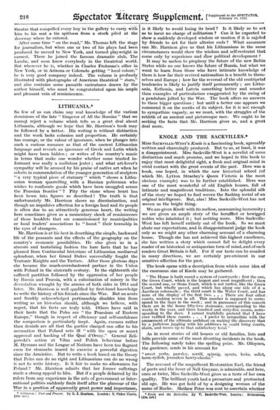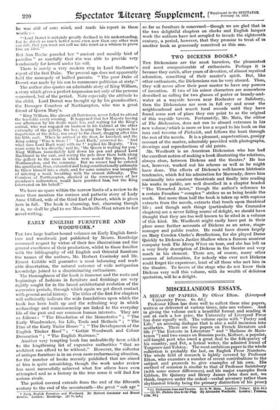KNOLE AND THE SACKVILLES.* Miss SACKVILLE-WEST'S Knole is a fascinating
book, agreeably written and charmingly produced. But to us, at least, it was
a disappointment. Miss Sackville-West is a novelist of some distinction and much promise, and we hoped in this book to
enjoy that most delightful sight, a fresh and original mind in vivid contact with the great events of the past. Here was a book, one hoped, in which the new historical school (of which Mr. Lytton Strachey's Queen Victoria is the most obvious example) was to be further established. Here was one of the most wonderful of old English houses, full of
intimate and magnificent traditions. Into the splendid silk of the story we hoped to find woven the flashing metal of an original intelligence. But, alas ! Miss Sackville-West has not woven us the bright thing.
We are given Knole with its mellow, unassuming immensity; we are given an ample story of the beruffled or bewigged nobles who inhabited it ; but nothing more. Miss Sackville- West has left herself entirely out of the book. So we must abate our expectations, and in disappointment judge the book only as we might any other charming account of a charming house. Though she has not achieved this highest excellence, she has written a story which cannot fail to delight every reader of an historical or antiquarian turn of mind, and of such readers Great Britain is full. For if our taste can be assailed in many directions, we are certainly pre-eminent in our sensitive affection for the past.
The book opens with a description from which some idea of the enormous size of Knole may be gathered.
" The House is built round a system of courtyards : first the one, the Green Court, which is the largest and most magnificent ; then the second one, or Stone Court, which is not turfed, like the Green Court, but wholly paved, and which has along one side of it a Jacobean colonnade ; the third court is the Water Court, and has none of the display of the first two. . . There are four other courts, making seven in all. This number is supposed to coffee spond to the days in the week ; and in pursuance of this conceit there are in the house fifty-two staircases, corresponding to the weeks in the year, and three hundred and sixty-five rooms corre- sponding to the days. I cannot truthfully pretend that I have ever verified these counts. . . . I prefer to sympathise with the amusement of the ultimate architect on making the discovery that by a judicious juggling with his additions he could bring courts, stairs, and rooms up to that satisfactory total."
As in most stories of old houses or old families, lists and bills provide some of the most diverting incidents in the book. The following surely takes the spelling prize. Mr. 011oynes, the gardener, sends in his account for
" sweet, verbs, pawsley, sorrill, spinnig, spruts, leeks, sand, horse-rydish, jerusalem hawty-chorks."
The account of the magnificent Restoration Earl, the friend of poets and the lover of Nell Gwynne, is admirable, and here, once or twice, Miss Sackville-West gives us a taste of her own quality. The brilliant youth had a premature and protracted old age. He was got hold of by a designing woman of the name of Roche. Mathew Prior was sent to ascertain whether
155 • Ka M * and . &chilies. By V. BsokvIne-Wast, London; )18111CMIUM, 8, osta
he was still of sane mind, and made his report in these words :-
"'Lord Doiset is certainly greatly declined in his understanding, but he drivels so much better sense even now than any other man can talk, that you must not call me into court as a witness to prove him an idiot.'"
But Ann Roche guarded her " ancient and mouldy bird of paradise " so carefully that she was able to provide very handsomely for herself under his will.
There is surely a very modern ring in Lord Shelburne's report of the first Duke. The present age does not apparently hold the monopoly of bullied parents. " The poor Duke of Dorset was made by his son to commence politician at sixty." The author also quotes an admirable story of King William, a story which gives a perfect impression not only of the persons concerned, but of the period. Note especially the attitude to the child. Lord Dorset was brought up by his grandmother, the Dowager Countess of Northampton, who was a great friend of Queen Mary's.
" King William, like almost all Dutchmen, never failed to attend the tea-table every evening. It happened that her Majesty having one afternoon by his desire made tea, and waiting for the King's arrival, who was engaged on business in his Cabinet at the other extremity of the gallery, the boy, hearing the Queen express her impatience at the delay, ran away to the closet, dragging after him his little cart. When he arrived at the door, he knocked, and the King asldng ' Who is there ? " Lord Buck,' answered he. ' And what does Lord Buck want with me 1' replied his Majesty. ' You must come to tea directly,' said he, ' the Queen is waiting for you.' King William immediately laid down his pen and placed Lord Iuckhurst in the cart, and seizing the pole drew them both along the gallery to the room in which were seated the Queen, Lady Northampton, and the company. But no sooner had he entered the apartment, than, exhausted and being constitutionally asthmatic he threw himself into a chair, and for some minutes was incapable of uttering a word, breathing with the utmost difficulty. The Countess of Northampton, shocked at the consequences of her grandson's indiscretion, would have punished him, but the King intervened on his behalf."
We have no space within the narrow limits of a review to do more than mention the curious and pathetic story of Lady Anne Clifford, wife of the third Earl of Dorset, which is given here in full. The book is charming, but, charming though it is, we shall be glad to see Miss Sackville-West return to her novel-writing.



































































 Previous page
Previous page